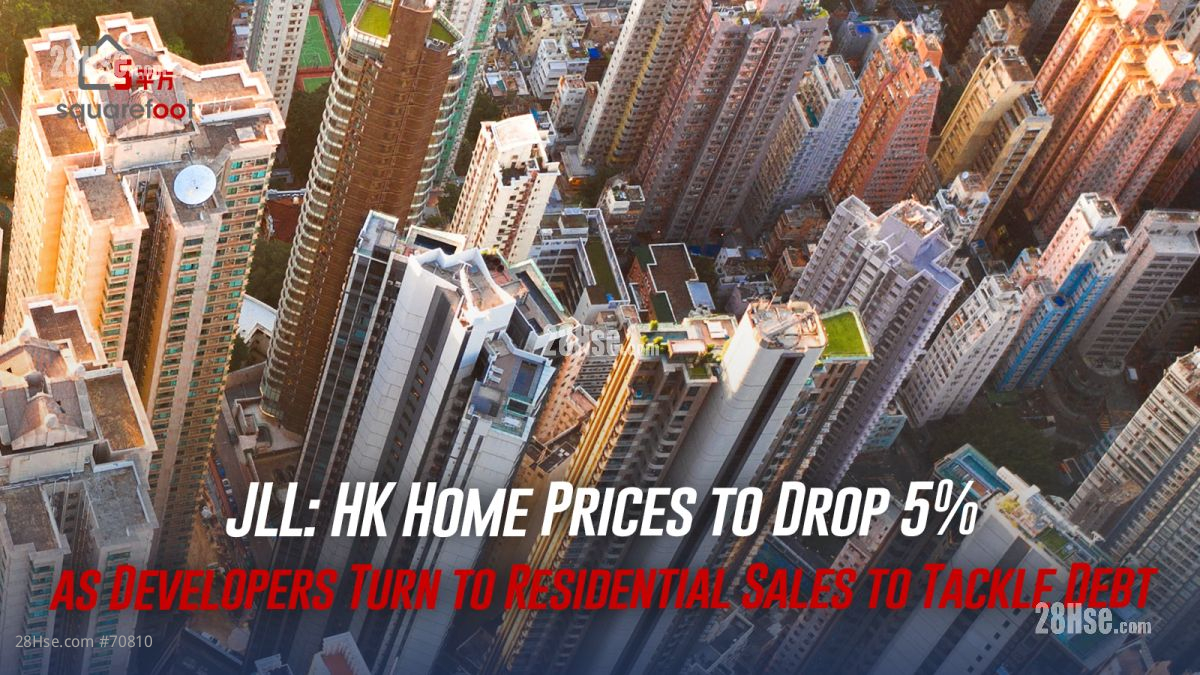On July 9, Jones Lang LaSalle (JLL) released its mid-2025 review and forecast for Hong Kong’s real estate market. The report highlighted several positive factors in the first half of the year, including the easing of the US-China trade war and low interbank lending rates. However, mounting inventory pressure on developers has kept housing prices on a downward trend. JLL expects prices for small- to medium-sized residential units to fall by 5% this year. For luxury properties, the forecast has been revised to a 5% to 10% decline, up from the earlier estimate of 5%. Developers are expected to continue offering discounts on new projects in the second half of the year to accelerate sales. Meanwhile, residential rental prices are projected to rise by up to 9%, driven by demand from mainland professionals and students, potentially reaching record highs.
JLL Hong Kong chairman Joseph Tsang noted that the recent completion of large-scale residential projects has led to an increase in forfeited transactions. While major developers remain stable, smaller and mid-sized developers face significant financial challenges. To address these issues, developers are aggressively pricing new projects to generate cash flow. Tsang emphasised that residential properties have effectively become the main source of revenue for developers, as commercial properties face difficulties due to weak rental yields.
Although developers have achieved strong sales with their low-price strategies, Tsang pointed out that the secondary market is struggling, with prices needing further adjustments to compete with new developments. While there are signs of hope for the housing market in the second half of the year, Tsang described the situation as "a distant light at the end of a deep tunnel." He highlighted the uncertainty surrounding US monetary policy and the potential continuation of the trade war, which could significantly impact the market. On the rental side, demand is expected to remain strong, particularly from beneficiaries of Hong Kong's talent visa program, which will likely push rents even higher.
The luxury property market is also under pressure. Some investors, facing financial difficulties and unable to liquidate commercial properties, have opted to sell luxury residential properties at discounted prices. Tsang predicted a 5% to 10% drop in luxury property prices as these investors, burdened by various pressures, rush to generate cash.
When asked about the risk of developers defaulting on loans, Tsang acknowledged the severity of the issue but noted that banks have generally been cooperative, preferring to "weather the storm together" rather than calling in loans. However, he also warned that the government’s official figures on negative equity, which stand at over 40,000 cases, may underestimate the true scale of the problem. Including secondary mortgages and other factors, the actual number could be as high as 70,000-80,000 cases.
JLL’s report highlighted several challenges for the market, including high levels of unsold inventory, discounted sales of new projects, and potential risks in the commercial property sector. While positive factors such as lower HIBOR rates and increased stock market activity could support the market, significant geopolitical uncertainties and record-high levels of negative equity remain major obstacles.
As of March 2025, there were approximately 93,000 unsold units in the primary market, with inventory levels requiring an estimated 56.7 months to clear—significantly longer than the 51.3-month average from 2015 to 2021. JLL predicts that housing prices will only begin a sustained recovery in late 2026, once inventory levels return to healthier levels.
Despite these challenges, macroeconomic indicators suggest that the rate of price declines may slow. Increased demand for rental properties, driven by population growth under Hong Kong’s talent visa scheme, could eventually translate into stronger home-buying demand. In the meantime, developers will likely continue to rely on aggressive pricing strategies to navigate the current market environment.
Like

